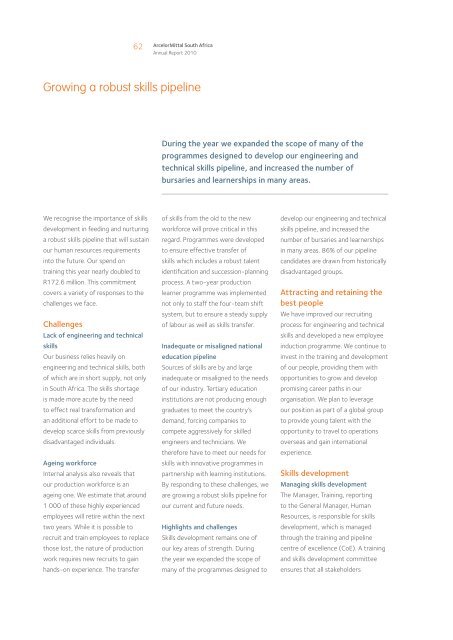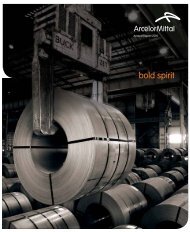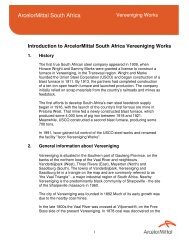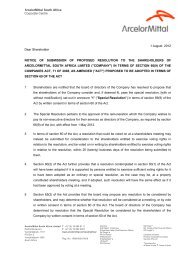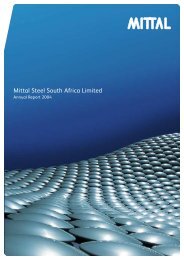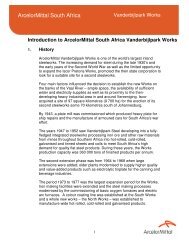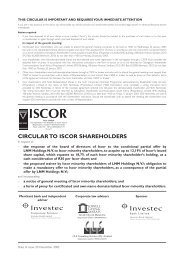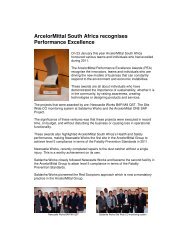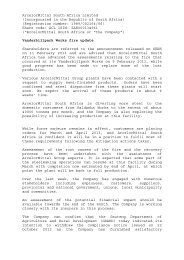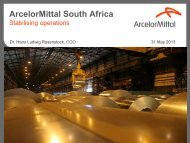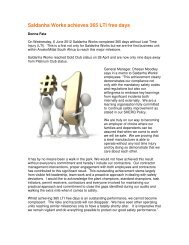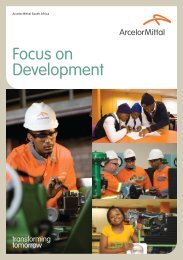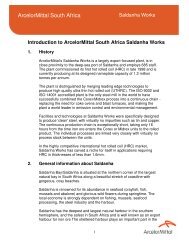bold spirit - ArcelorMittal South Africa
bold spirit - ArcelorMittal South Africa
bold spirit - ArcelorMittal South Africa
Create successful ePaper yourself
Turn your PDF publications into a flip-book with our unique Google optimized e-Paper software.
62<br />
<strong>ArcelorMittal</strong> <strong>South</strong> <strong>Africa</strong><br />
Annual Report 2010<br />
Growing a robust skills pipeline<br />
During the year we expanded the scope of many of the<br />
programmes designed to develop our engineering and<br />
technical skills pipeline, and increased the number of<br />
bursaries and learnerships in many areas.<br />
We recognise the importance of skills<br />
development in feeding and nurturing<br />
a robust skills pipeline that will sustain<br />
our human resources requirements<br />
into the future. Our spend on<br />
training this year nearly doubled to<br />
R172.6 million. This commitment<br />
covers a variety of responses to the<br />
challenges we face.<br />
Challenges<br />
Lack of engineering and technical<br />
skills<br />
Our business relies heavily on<br />
engineering and technical skills, both<br />
of which are in short supply, not only<br />
in <strong>South</strong> <strong>Africa</strong>. The skills shortage<br />
is made more acute by the need<br />
to effect real transformation and<br />
an additional effort to be made to<br />
develop scarce skills from previously<br />
disadvantaged individuals.<br />
Ageing workforce<br />
Internal analysis also reveals that<br />
our production workforce is an<br />
ageing one. We estimate that around<br />
1 000 of these highly experienced<br />
employees will retire within the next<br />
two years. While it is possible to<br />
recruit and train employees to replace<br />
those lost, the nature of production<br />
work requires new recruits to gain<br />
hands-on experience. The transfer<br />
of skills from the old to the new<br />
workforce will prove critical in this<br />
regard. Programmes were developed<br />
to ensure effective transfer of<br />
skills which includes a robust talent<br />
identification and succession-planning<br />
process. A two-year production<br />
learner programme was implemented<br />
not only to staff the four-team shift<br />
system, but to ensure a steady supply<br />
of labour as well as skills transfer.<br />
Inadequate or misaligned national<br />
education pipeline<br />
Sources of skills are by and large<br />
inadequate or misaligned to the needs<br />
of our industry. Tertiary education<br />
institutions are not producing enough<br />
graduates to meet the country’s<br />
demand, forcing companies to<br />
compete aggressively for skilled<br />
engineers and technicians. We<br />
therefore have to meet our needs for<br />
skills with innovative programmes in<br />
partnership with learning institutions.<br />
By responding to these challenges, we<br />
are growing a robust skills pipeline for<br />
our current and future needs.<br />
Highlights and challenges<br />
Skills development remains one of<br />
our key areas of strength. During<br />
the year we expanded the scope of<br />
many of the programmes designed to<br />
develop our engineering and technical<br />
skills pipeline, and increased the<br />
number of bursaries and learnerships<br />
in many areas. 86% of our pipeline<br />
candidates are drawn from historically<br />
disadvantaged groups.<br />
Attracting and retaining the<br />
best people<br />
We have improved our recruiting<br />
process for engineering and technical<br />
skills and developed a new employee<br />
induction programme. We continue to<br />
invest in the training and development<br />
of our people, providing them with<br />
opportunities to grow and develop<br />
promising career paths in our<br />
organisation. We plan to leverage<br />
our position as part of a global group<br />
to provide young talent with the<br />
opportunity to travel to operations<br />
overseas and gain international<br />
experience.<br />
Skills development<br />
Managing skills development<br />
The Manager, Training, reporting<br />
to the General Manager, Human<br />
Resources, is responsible for skills<br />
development, which is managed<br />
through the training and pipeline<br />
centre of excellence (CoE). A training<br />
and skills development committee<br />
ensures that all stakeholders


